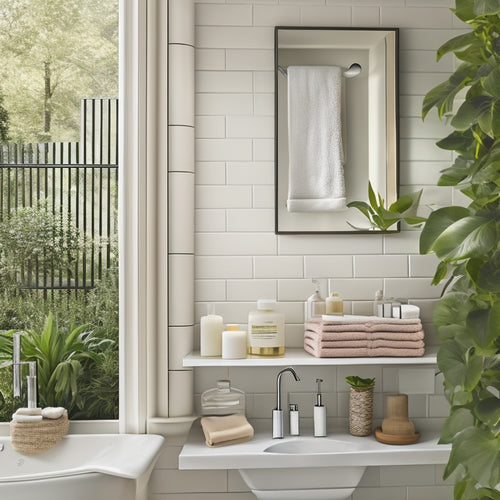
Empowerment Toolkit: Safeguarding LGBTQIA+ Student Rights
Share
You have the right to a safe and inclusive education, free from discrimination and harassment, and it's time to exercise that right. You're entitled to protection from bullying and harassment, and schools must respect your affirming names and pronouns. You can form Gender and Sexuality Alliances (GSAs) and advocate for yourself through student advocacy. But that's not all - you also deserve access to safe facilities, like restrooms and locker rooms that match your gender identity. By understanding your rights and taking action, you can create a more inclusive school community - and that's just the beginning of your empowerment journey.
Key Takeaways
• Understand and assert your rights to protection from bullying and harassment, and to use affirming names and pronouns in school.
• Advocate for access to safe facilities, including gender-separated facilities, restrooms, and locker rooms that match your gender identity.
• Create allies and advocate for change by promoting inclusivity in school policies and practices, and addressing discrimination and harassment effectively.
• Know how to navigate the complaint process, including documenting incidents, trying informal resolution, and filing formal complaints with evidence and testimony.
• Embrace your rights and take action by forming GSAs, respecting names and pronouns, and advocating for inclusive policies to create a safer and more inclusive school community.
Understanding Student Rights
As you navigate the complex landscape of education, understanding your rights as an LGBTQIA+ student is essential to guaranteeing a safe, supportive, and inclusive learning environment. You have rights derived from the U.S. Constitution and federal law, including protection from bullying and harassment, using affirming names and pronouns, and forming Gender and Sexuality Alliances (GSAs).
Schools are legally obligated to provide a safe space for you. Misgendering and deadnaming violate federal law and school policies, and you can advocate for yourself through student advocacy. Legal protections are in place to safeguard your rights are respected.
Access to Safe Facilities
You have the right to access gender-separated facilities that align with your gender identity, ensuring your safety and comfort in school. This means you should be able to use restrooms and locker rooms that match your gender identity, without fear of harassment or discrimination.
Schools are legally obligated to provide safe and accessible facilities for all students, including LGBTQIA+ individuals. Ensuring inclusion and promoting safety in facilities is vital for creating a welcoming environment. All-gender and single-user restrooms can be added to guarantee safe access for everyone.
Advocating for Change
To fully exercise your rights, it's important to know how to advocate for yourself and others when facing discrimination or harassment in school.
You can start by creating allies among teachers, classmates, and school administrators who support LGBTQIA+ students' rights.
Promoting inclusivity in school policies and practices is vital to creating a safe and welcoming environment.
When advocating for change, it's necessary to be clear, respectful, and specific about the issues you're facing and the solutions you propose.
By doing so, you can effectively address discrimination and harassment, and create a more inclusive school community.
Navigating the Complaint Process
Filing a complaint can be a challenging task, but understanding the process and your rights is essential in effectively addressing discrimination and harassment. You have the power to advocate for yourself and others by filing grievances and resolving conflicts.
Start by documenting incidents, including dates, times, and details of what happened. If you're comfortable, try resolving the issue informally with school administrators. If that doesn't work, you can file a formal complaint. Be prepared to provide evidence and testimony during the grievance hearing.
The Power of Empowerment
By embracing their rights and taking action, LGBTQIA+ students can harness the power of empowerment to create a safer, more inclusive environment for themselves and their peers. You can make a difference by knowing your rights, forming GSAs, and advocating for inclusive policies.
The impact of empowerment is significant, leading to reduced depression, suicide attempts, and increased feelings of safety.
Respecting names and pronouns
GSAs, allies, and advocates
Document incidents, file complaints
Inclusive policies and language
School administrators, counselors
Form GSAs, advocate for policies
Reduced depression and suicide
Federal civil rights agencies
File appeals, seek support
Frequently Asked Questions
How Do I Handle Pushback From School Administrators or Teachers?
As you navigate ancient Greek-style 'AGON' with resistant administrators, remember you're not alone. Request Administrator Training on LGBTQIA+ issues and Policy Review to guarantee inclusivity, citing federal laws and guidelines that safeguard student rights.
Are Lgbtqia+ Students Protected in Religious or Private Schools?
You should know that LGBTQIA+ students in religious or private schools might not have the same protections as public schools, due to legal exemptions and religious freedoms, which can limit their rights and access to supportive environments.
Can I Start a GSA in a Middle School or Elementary School?
You can start a GSA in a middle school or elementary school, and it's amazing you're considering it! GSAs can be incredibly powerful in fostering youth leadership and age-appropriate support for LGBTQIA+ students, creating a safer and more inclusive environment for all.
What if I'm Not Out to My Parents or Guardians About My Identity?
If you're not out to your parents or guardians about your identity, consider talking to a trusted teacher, school counselor, or LGBTQIA+ organization for support, as they can help you navigate home life and identity anxiety while keeping your confidentiality.
How Do I Balance Advocating for Myself With Self-Care and Stress?
You're 54% less likely to experience severe depression when respected with your chosen name and pronouns. To balance advocacy with self-care, set boundaries, prioritize energy management, and delegate tasks to maintain emotional well-being while fighting for your rights.
Related Posts
-

Creative Open Shelving for Bathroom Displays
You're looking to change your bathroom into a serene oasis, and creative open shelving is the perfect way to showcase...
-

Momtrepreneurs: Master Organization for Success
As a busy momtrepreneur, I've learned that mastering organization is the key to unleashing my full potential. To achi...
-

Bronze Bathroom Organizer: Stylish Space-Saving Solution
Bronze bathroom organizers effortlessly combine elegant design with efficient storage solutions, providing a sophisti...


